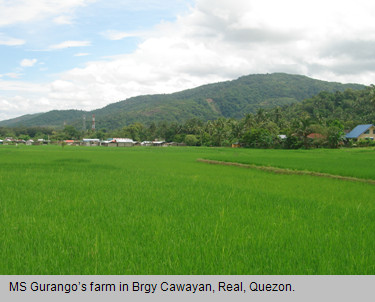 Magsasaka Siyentista (MS) Lucio L. Gurango of Barangay Cawayan in Real, Quezon is now making the big switch. From his “traditional” rice production practice of 42 years, he is now going organic.
Magsasaka Siyentista (MS) Lucio L. Gurango of Barangay Cawayan in Real, Quezon is now making the big switch. From his “traditional” rice production practice of 42 years, he is now going organic.
Engr. Artemio Rajie M. Villenas, technical expert from the Southern Luzon State University, termed it an “ecological approach in growing rice.”
MS Gurango was convinced to switch to organic rice farming because of the high cost of production for traditional rice using conventional farm practice.
MS Gurango of the Farmers’ Information and Technology Services Center of Social Action Quezon-Nakar, Quezon (SAQ-NQ) is the latest cooperator of PCARRD’s Science and Technology-based Farm (STBF) Project.
To cut on cost, Gurango will test the following science and technology (S&T) interventions: using “dapog” method of raising seedlings, planting of five seedlings per hill, following a 20 x 20 cm planting distance, and using chicken manure for fertilizer.
For seed varieties, he will continue to use Black Rice, Masipag, AG 5, M1-96, and M1-80-1, which are locally available.
Gurango intends to apply 15 bags of fertilizer from chicken manure per hectare. This is expected to increase yield by as much as 20% or an additional harvest of 40 cavans per hectare. The MS produces an average of 98 cavans per hectare using his traditional farm practice.
Engr. Villenas, an advocate of natural farming, prescribes the use of insect repellant to Gurango. He believes that managing pest populations is vital in keeping a balanced ecosystem.
During an STBF inception meeting held recently at the FITS SAQ-NQ, Deacon Theodorus Mario Van Loon, executive secretary of SAC-NQ, pointed out the importance of the S&T-based farm project in improving productivity and increasing farmers’ income.
Incidentally, rice farming is the major source of peoples’ livelihood in the area with Barangay Cawayan as the rice granary of the municipality of Real.
